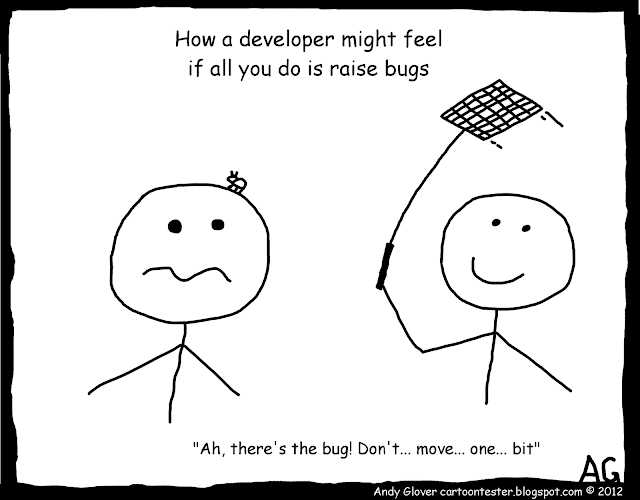In a recent post I asked if you could guess what my original idea for the cartoon was. I received loads of feedback about the cartoon which made me think I should do more posts like it.
Today's cartoon is missing the caption/s. Can you suggest any ideas? You could come up with a the title, a subtitle or a (or a couple) of speech bubbles from the bugs. Give it a go and leave a comment. I'll update the cartoon in a few days with my favourite response.
Wednesday, 29 February 2012
Friday, 24 February 2012
The art of bug reporting
This cartoon was first printed in the STC's The Testing Planet.
... Like a good artist, you'll know when to follow the rules (of thumb) and when not to.
... Like a good artist, you'll know when to follow the rules (of thumb) and when not to.
Monday, 20 February 2012
Wednesday, 15 February 2012
Before Computers
There's a hidden message in the cartoon that I wanted to highlight. But thinking about it, there are a few messages the cartoon could be highlighting. So, please leave a comment if you have an idea of what the cartoon could teach us about testing. Thanks!! I wonder if anyone will guess my original idea for the cartoon...
Thursday, 9 February 2012
Curiosity. If cats were testers
I did a few of the cat and mouse cartoons last Summer but somehow failed to post them in 2011. Here's one now:
What you believe life is, affects the way you live. What you believe testing is, affects the way you test.
That’s why it’s important, in my opinion, for testers to understand what testing is about and how test approaches differ between testers. That’s the reason I think the concept of Schools of Testing can be helpful.
The Schools of Testing is a way of grouping testing approaches so that it’s easier to differentiate between each one. Although the schools can seem divisive, it does help in identifying, or at least pointing to, the big Why of testing. Why did you test it that way? Why didn’t you test it in this other way? Why are you following this approach or this process?
Here’s how I would answer the big Why of testing: I believe that each software development project is unique. Each will have its own problems and to be efficient, will require new solutions. For Testers, they will have new bugs to find, some will be very similar to previous projects and some will come as a surprise. That is why I count myself in the Context Driven School. Testers need to be inquisitive, alert, sceptical and thinking of brand new ways to make testing faster or better or both. Software development projects will need curious testers who want to learn quickly about the software under test.
Michael Bolton spoke at last year’s CAST conference, the main topic was Context Driven Testing. The write up of the talk is here. He discusses the helpfulness and unhelpfulness of the school of testing and describes Context Driven characteristics:
For additional background reading, you might want to read this where Brett Pretticord gave a presentation on four schools of testing.
Wednesday, 1 February 2012
Subscribe to:
Comments (Atom)










